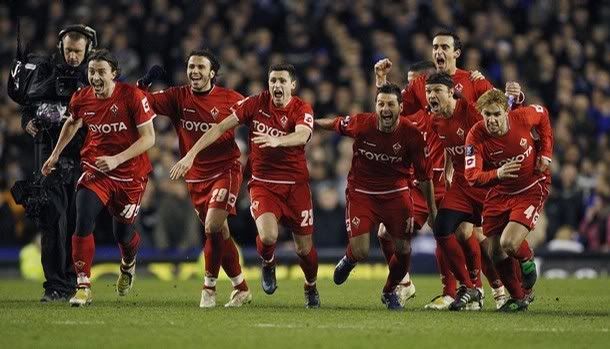What strikes me as equally tragic, though, is that Juventus essentially had no choice but to postpone the match, such is the degree of power Ultras wield over Italian clubs. And there is no question in my mind that Juve made the right decision, because had the match been played, there would have been almost obligatory violence, presumably similar to that at Atalanta after Gabriele Sandri's death.
The situation is really difficult to fully sort out -- there was an accident that involved football supporters, yes. But there are accidents that involve sports fans on the way to support their teams depressingly often, and they almost never seem to affect the playing of the events those fans were going to attend. And maybe that's a bad thing -- maybe Italy is right in stopping to recognize tragedy when it strikes calcio's extended family. It would be easier to appreciate, though, if the stoppage was a decision motivated by something other than fear.
* * *
Coincidentally, the eternally wise Clarence Seedorf has given a timely interview in which he restates his reasons for refusing to wear a black armband in that match against Atalanta, and questions Italian football's apparent eagerness to salute a fan while refusing to organize mourning for either Kakha Kaladze's brother or Cesare Prandelli's wife, both of whom died tragically.
* * *
UEFA spokesman William Gaillard casually announced today that the 2009 Champions League Final could be moved from Rome if there is trouble tomorrow when Roma hosted Manchester United. Bizarrely (tellingly?) there's no mention of his words on the UEFA website, but the fact remains that when something of that magnitude comes out of Gaillard's mouth, it sounds awfully official.
And his statement is entirely reasonable -- despite the (mostly) peaceful group stages visit United made to Rome last December, it's impossible to shake the memory of those awful scenes last spring, when police tore through the United support leaving injuries and a (further) tattered Italian reputation in their wake.
But why would the statement be made in a press conference, rather than during serious, private conversations with Roma authorities, so they know what's at stake? Why tell everyone about it, and thereby open up the floor to people more interested in violence than football (no matter who they support) to be the ones to determine where the Champions League final is held?
Gaillard's statement indicated that there have been vast improvements in conditions inside the Olimpico, but added, in reference to incidents that took place in December, "We cannot have responsibility for bringing 40,000 people to the final and risk them being knifed in the city." Apart from the incredible insult of making Rome sound like it's teeming with knife-wielding maniacs, he's making an entirely reasonable point.
When the details started to come out about the December stabbings, though, it seemed that the fight happened in a known Ultra gathering place, and that the United supporters involved had broken off from the group being taking to the Olimpico, going in search of conflict. Now, I'm in no way saying they were asking to be stabbed, or that it's not awful that conflict can be found if one goes looking, but the fact is that there are "football supporters" everywhere for whom a match is as much an excuse for violence as it is anything else. Can the clubs be held responsible for those people when they encounter one another away from grounds? I really have no idea, but I don't like the idea of potentially putting the location of the CL Final in their hands.


